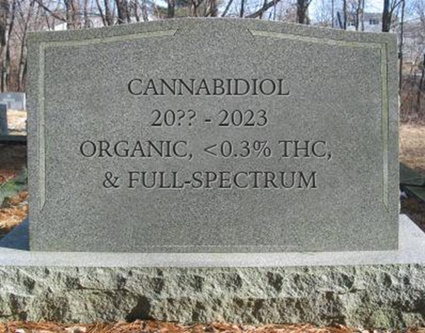Recently, the FDA gave a conclusion to the CBD story. In short, they reconfirmed that CBD is not allowed in dietary supplements or conventional foods, and confirmed that they do not intend to pursue rulemaking that would allow it.
Will this “news” do anything to change the market flooded with these illegal products? Unlikely. There is a segment of the industry that has so far largely ignored the red flags such as the droves of FDA Warning Letters (lots of them), the scant science to give any credence to the claims (“but Big Brand X says it’s good for insomnia, pain, depression, COVID-19, etc.” is not substantiation), the fact that most legitimate manufacturers won’t touch CBD, the lack of banks to process the sales, the lack of networks that will run ads, the wacky labeling rules – aka violations (somehow isolated CBD = hemp extract), and so on. Many convinced that the all but irrelevant 2018 Farm Bill legalized CBD in supplements and foods, and so felt justified to join the mob of CBD sellers.
Will FDA enforcement change? Time will tell. Probably just more of the same. Expect to see continued Warning Letters for products making disease claims, with reminders that CBD isn’t a legal dietary ingredient.
DSE has dozens of clients working with CBD. Our advice generally has centered around risk mitigation – not making disease claims, not making unsubstantiated claims, labeling the products compliantly as possible (as if CBD were legal), and keeping a close eye on product quality. Risk of selling CBD products might be low, reward might be high, but make no mistake – CBD in supplements has not been legal, is not legal, and will not become legal according to the FDA.

